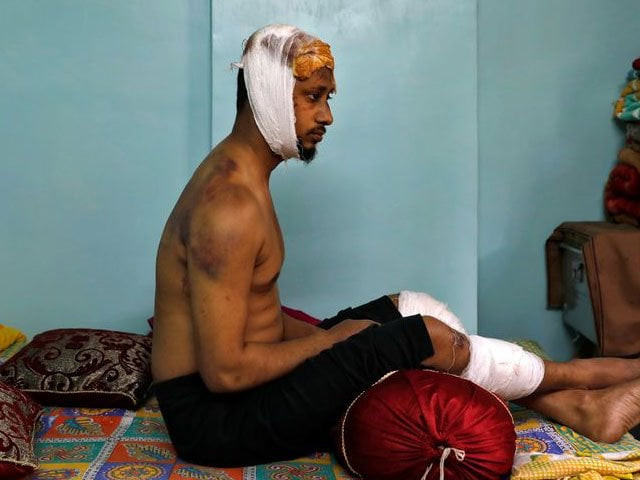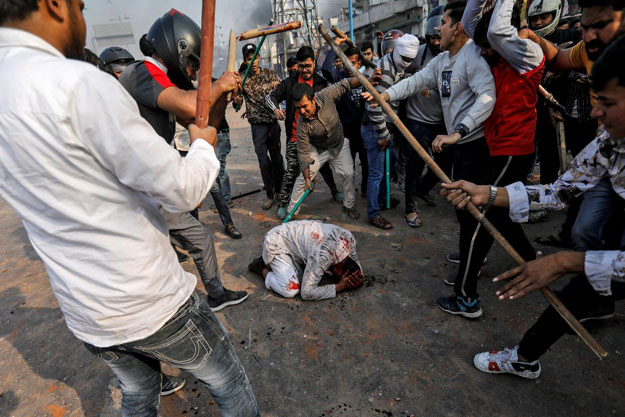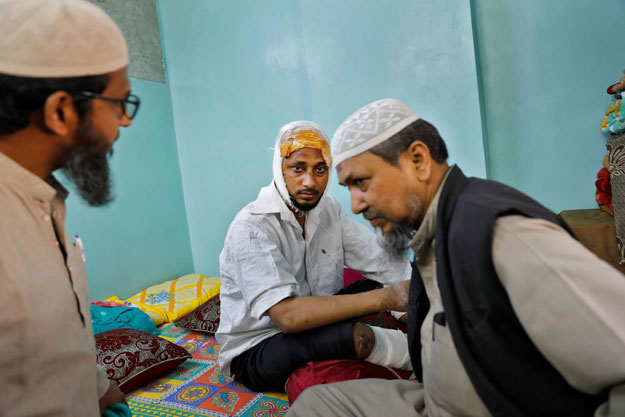‘They saw I was alone, they saw my cap, beard, clothes and saw me as a Muslim’
Zubair, captured in a viral photograph, recalls how a Hindu crowd beat him with wooden sticks and metal rods in Delhi

A group of men chanting pro-Hindu slogans, beat Mohammad Zubair, 37, who is Muslim, during protests sparked by a new citizenship law in New Delhi, India, February 24, 2020. PHOTO: REUTERS
Within seconds, he was cowering on the ground surrounded by more than a dozen young men, who began beating him with wooden sticks and metal rods. Blood flowed from his head, spattering his clothes. The blows intensified. He thought he would die.
Zubair provided his version of events at a relative’s home in another part of the capital, his head wrapped in bandages.
The mid-afternoon attack on Monday, captured in a dramatic Reuters photograph, came against a backdrop of tension and violence.
Near the area of the Indian capital where it occurred, Muslim and Hindu protesters had been fighting pitched battles for hours across a concrete and metal barrier that divided the main thoroughfare, throwing rocks and primitive petrol bombs.
 A group of men chanting pro-Hindu slogans, beat Mohammad Zubair, 37, who is Muslim, during protests sparked by a new citizenship law in New Delhi, India, February 24, 2020. PHOTO: REUTERS
A group of men chanting pro-Hindu slogans, beat Mohammad Zubair, 37, who is Muslim, during protests sparked by a new citizenship law in New Delhi, India, February 24, 2020. PHOTO: REUTERSBut the sight of a mob screaming pro-Hindu slogans suddenly turning on an unarmed individual, apparently because he was a Muslim, was a sign that growing tensions between members of India’s two dominant religions may be hard to contain.
Unrest across India began in December with the passing of a law that makes non-Muslims from some neighbouring nations eligible for fast-tracked citizenship - a move many Muslims say is discriminatory and marks a break from India’s secular traditions.
Persecuted religious minorities including from Hindu, Sikh, or Christian communities are eligible for citizenship, but those from Islam do not enjoy all the same advantages.
Prime Minister Narendra Modi’s Hindu nationalist Bharatiya Janata Party (BJP) says the new citizenship law is necessary to protect persecuted minorities from Pakistan, Bangladesh and Afghanistan, and denies any bias against India’s Muslims.
US commission demands India act after religious riots in New Delhi
“They saw I was alone, they saw my cap, beard, shalwar kameez (clothes) and saw me as a Muslim,” Zubair told Reuters. “They just started attacking, shouting slogans. What kind of humanity is this?”
Appeal for calm
Modi appealed for calm on Wednesday. The citizenship law behind the unrest is one of several steps taken by Modi’s government since its re-election that have appealed to the Hindu majority.
In August, it stripped Indian-occupied Kashmir (IOK) of its special status.
In November, the Indian Supreme Court handed Hindu groups control of a contested site in the city of Ayodhya that paves the way for a temple to be built on a site where a mosque once stood. That was a central election promise made by the BJP.
Modi’s position as chief minister of Gujarat state during some of the worst riots in India’s independent history that took place there in 2002 has long stoked mistrust among some Muslims.
 A group of men chanting pro-Hindu slogans, beat Mohammad Zubair, 37, who is Muslim, during protests sparked by a new citizenship law in New Delhi, India, February 24, 2020. PHOTO: REUTERS
A group of men chanting pro-Hindu slogans, beat Mohammad Zubair, 37, who is Muslim, during protests sparked by a new citizenship law in New Delhi, India, February 24, 2020. PHOTO: REUTERSUp to 2,500 people, mostly Muslims, were killed during riots sparked after 59 Hindu pilgrims were burned to death when their train was set alight by suspected Muslims.
In the subsequent investigation, Modi was absolved of wrongdoing, even as dozens of people on both sides of the riots were convicted.
“Remembering my Allah”
Before this week’s clashes in New Delhi, 25 people had been killed in running battles between protesters and police across the country.
That number has now nearly doubled after two days of arson, lootings, beatings and shootings in parts of north-eastern New Delhi that police forces have struggled to contain.
Delhi police said in a statement late on Tuesday that they were making every effort to contain the clashes and urged people to maintain the peace.
Witnesses said police and paramilitary forces were patrolling the streets in far greater numbers on Wednesday. Parts of the riot-hit areas were deserted.
Modi calls for calm after deadly Delhi riots
Several of those killed and injured had been shot, according to two medics at the Guru Teg Bahadur Hospital, where many of the victims were taken. Reuters could not determine who had fired on them.
Among them, Yatinder Vikal, a 33-year-old Hindu, was brought in with a gunshot wound to his right knee. His brother said Yatinder was driving a scooter when a bullet hit him.
Reuters witnesses at a local hospital spoke to both Hindu and Muslim victims who were injured in the violence.
An unconscious Zubair was eventually dragged to safety by fellow Muslims who came to his aid after throwing stones to disperse his attackers.
The 37-year-old, who makes a living doing odd jobs, was rushed to hospital where he was treated for wounds to his head and released late on Monday.
“I was thinking ‘I’m not going to survive this’,” he recalled. “I was remembering my Allah.”



















COMMENTS
Comments are moderated and generally will be posted if they are on-topic and not abusive.
For more information, please see our Comments FAQ